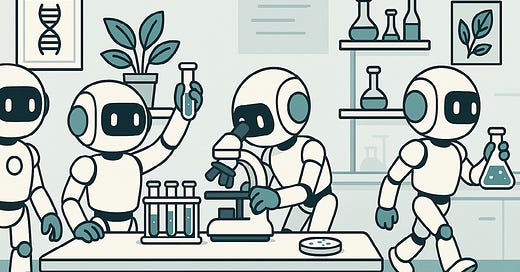The Rise of AI Agents in Biotech, Where Are We Now?
A bird's eye view of the emerging field, taking look at several notable academic and commercial examples.
In today's deep dive, guest contributor
takes us through the current state of AI agents in biotech, exploring their technical foundations and early-stage applications.There's been a growing buzz around “AI agents” across the tech ecosystem, with promises of autonomy, automation, and accelerated discovery. In biotech and drug development, however, their real-world presence is still early-stage. Most practitioners have only a vague notion of what agents are—usually linked to a few demos or press releases. Few tools are widely deployed, and there’s little consensus yet on where agents genuinely add value.
That said, a number of academic labs, startups, and even large biopharma companies are quietly building agentic systems. They reason through tasks, chain tools, and interact with structured biological data.
In this post, we take a grounded look at these emerging systems. No hype, just the current landscape: what’s working, what isn’t, and what technical opportunities and constraints are shaping the field today.
🤖 What Are AI Agents Doing in Biotech—Technically?
Modern agents in biotech combine three technical layers:
I. LLM Core: Typically GPT-4, Claude 3.5, or DeepSeek for task decomposition and natural language reasoning. Some use fine-tuned BioLLMs like BioGPT for domain context.
II. Tool Layer: Dynamically called APIs and function endpoints. These can include:
Local database queries (e.g., from curated gene sets or lab-specific datasets);
Code execution for data analysis using internal Python kernels.
III. Orchestration Framework: Chain-of-thought agents often use custom ReAct-style loops, where the LLM issues tool calls and updates an internal scratchpad. ToolRAG (used in TxAgent) performs retrieval-aware tool selection, for instance.
Agents like TxAgent and BioDiscoveryAgent are not monolithic—they rely on this orchestration model to dynamically pull in tools and retrievable biomedical context at each reasoning step.
🧭 Spotlight: SpatialAgent and the Frontier of Spatial Genomics
One of the most technically complete and domain-specific agent frameworks to emerge recently is SpatialAgent by a team of Genentech, developed to tackle spatial biology problems using a self-governing LLM architecture.




